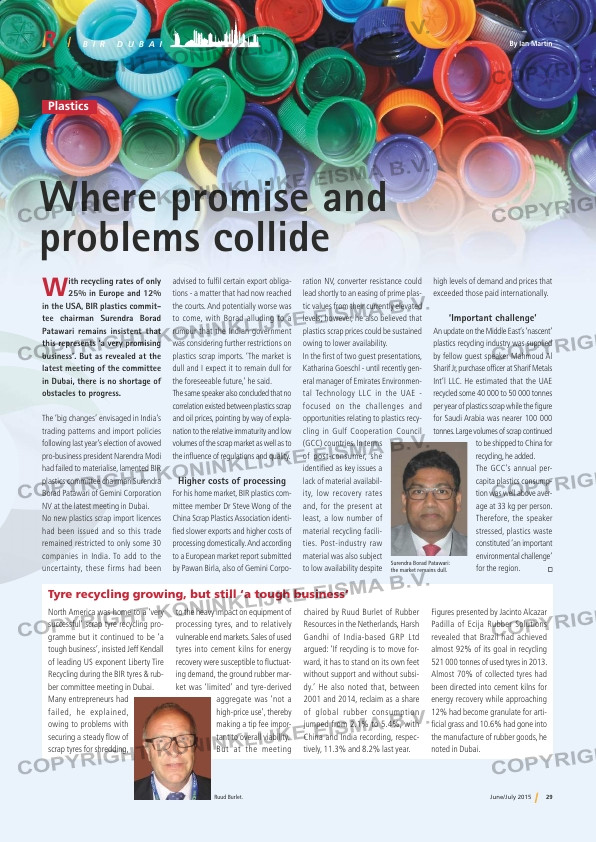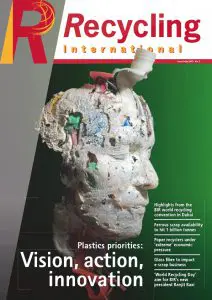Page 29 from: June / July 2015

B I R D U B A I By Ian Martin
Tyre recycling growing, but still ‘a tough business’
North America was home to a ‘very
successful’ scrap tyre recycling pro-
gramme but it continued to be ‘a
tough business’, insisted Jeff Kendall
of leading US exponent Liberty Tire
Recycling during the BIR tyres & rub-
ber committee meeting in Dubai.
Many entrepreneurs had
failed, he explained,
owing to problems with
securing a steady fl ow of
scrap tyres for shredding,
to the heavy impact on equipment of
processing tyres, and to relatively
vulnerable end markets. Sales of used
tyres into cement kilns for energy
recovery were susceptible to fl uctuat-
ing demand, the ground rubber mar-
ket was ‘limited’ and tyre-derived
aggregate was ‘not a
high-price use’, thereby
making a tip fee impor-
tant to overall viability.
But at the meeting
chaired by Ruud Burlet of Rubber
Resources in the Netherlands, Harsh
Gandhi of India-based GRP Ltd
argued: ‘If recycling is to move for-
ward, it has to stand on its own feet
without support and without subsi-
dy.’ He also noted that, between
2001 and 2014, reclaim as a share
of global rubber consumption
jumped from 2.1% to 5.4%, with
China and India recording, respec-
tively, 11.3% and 8.2% last year.
Figures presented by Jacinto Alcazar
Padilla of Ecija Rubber Solutions
revealed that Brazil had achieved
almost 92% of its goal in recycling
521 000 tonnes of used tyres in 2013.
Almost 70% of collected tyres had
been directed into cement kilns for
energy recovery while approaching
12% had become granulate for arti-
fi cial grass and 10.6% had gone into
the manufacture of rubber goods, he
noted in Dubai.
Plastics
Surendra Borad Patawari:
the market remains dull.
Ruud Burlet.
Where promise and
problems collide
29June/July 2015
With recycling rates of only 25% in Europe and 12%
in the USA, BIR plastics commit-
tee chairman Surendra Borad
Patawari remains insistent that
this represents ‘a very promising
business’. But as revealed at the
latest meeting of the committee
in Dubai, there is no shortage of
obstacles to progress.
The ‘big changes’ envisaged in India’s
trading patterns and import policies
following last year’s election of avowed
pro-business president Narendra Modi
had failed to materialise, lamented BIR
plastics committee chairman Surendra
Borad Patawari of Gemini Corporation
NV at the latest meeting in Dubai.
No new plastics scrap import licences
had been issued and so this trade
remained restricted to only some 30
companies in India. To add to the
uncertainty, these firms had been
advised to fulfi l certain export obliga-
tions – a matter that had now reached
the courts. And potentially worse was
to come, with Borad alluding to a
rumour that the Indian government
was considering further restrictions on
plastics scrap imports. ‘The market is
dull and I expect it to remain dull for
the foreseeable future,’ he said.
The same speaker also concluded that no
correlation existed between plastics scrap
and oil prices, pointing by way of expla-
nation to the relative immaturity and low
volumes of the scrap market as well as to
the infl uence of regulations and quality.
Higher costs of processing
For his home market, BIR plastics com-
mittee member Dr Steve Wong of the
China Scrap Plastics Association identi-
fi ed slower exports and higher costs of
processing domestically. And according
to a European market report submitted
by Pawan Birla, also of Gemini Corpo-
ration NV, converter resistance could
lead shortly to an easing of prime plas-
tic values from their currently elevated
levels; however, he also believed that
plastics scrap prices could be sustained
owing to lower availability.
In the fi rst of two guest presentations,
Katharina Goeschl – until recently gen-
eral manager of Emirates Environmen-
tal Technology LLC in the UAE –
focused on the challenges and
opportunities relating to plastics recy-
cling in Gulf Cooperation Council
(GCC) countries. In terms
of post-consumer, she
identifi ed as key issues a
lack of material availabil-
ity, low recovery rates
and, for the present at
least, a low number of
material recycling facili-
ties. Post-industry raw
material was also subject
to low availability despite
high levels of demand and prices that
exceeded those paid internationally.
‘Important challenge’
An update on the Middle East’s ‘nascent’
plastics recycling industry was supplied
by fellow guest speaker Mahmoud Al
Sharif Jr, purchase offi cer at Sharif Metals
Int’l LLC. He estimated that the UAE
recycled some 40 000 to 50 000 tonnes
per year of plastics scrap while the fi gure
for Saudi Arabia was nearer 100 000
tonnes. Large volumes of scrap continued
to be shipped to China for
recycling, he added.
The GCC’s annual per-
capita plastics consump-
tion was well above aver-
age at 33 kg per person.
Therefore, the speaker
stressed, plastics waste
constituted ‘an important
environmental challenge’
for the region.
RI 5- BIR textiles.indd 29 15-06-15 12:13



